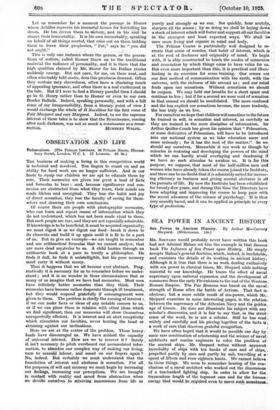. LITTLE TALES OF ITALY
II Novellino. Translated from the Italian by Edward Storer. . (Routledge. 7s. 6d. net.) Ma. STonEs. tells us of these stories that they were probably collected by a " giullare " at the end of the thirteenth or the beginning of the fourteenth century. They were the reduction to writing of the traditional stories that the wandering " best sellers " of the Dark Ages retailed to their almost defenceless audiences. Nor is this their only interest. They are among the earliest instances of the use in literature of the true Italian tongue, as distinct from the mixture, to which Mr. Storer refers, of Latin and French. They indicate further, by the curious errors as to fact which they contain, how oddly glfmpses of the past illuminated the Pre-Renaissance World. Socrates, for example, that great name, glittered through the clouds, but in the guise of a Roman, and as Mr. Storer points out, wearing the respectable reputation of Curio. And more than this the tales a little in matter and much in form are the obvious Primitives upon which Boccaccio improved.
For all these reasons Il Novellino was well worth translating, and Mr. Storer has performed a real service to students of literary origins who are unacquainted with the Italian tongue. But Mr. Storer does not rest himself on the archaeological value of these stories. At the end of his introduction, written With a pleasant concealment of the great weight of scholarship that it embodies, he suddenly observes that : " There is in them as their especial merit great humanity, passion, drama, and often a wisdom so old and mysterious that it seems to reach back through half a dozen civilizations to the very heart and mind of early man."
This is high language, and, in face of it, I am driven back to look for a moment at the other example of man's early artistic instinct that is contained in the work that was ascribed to that other ".giullare " Homer. The Iliad and the Odyssey, how- 0;'er and by whomsoever they were written, were undoubtedly like the Novellino, the collection of a great mass of oral tradi. tion, and as such may perhaps be used to illustrate how little these historically interesting tales deserve. this literary com. mendation. Mr. Storer admits—nay, rather contends—that the story-teller did not waste himself in psychology; but just tells his story and passes on. The virtue is solely in the narrative, and therefore it is in the narratiye itself that " humanityi..; pitssion; drania 'and wisdom must reVearthemseives.
Let us remember f9r a moment the passage in Homer where Achilles reproves his immortal horses for foretelling his doom. He has driven them to Arictory, and in his soul he shares their immortality. It is his own immortality, speaking on behalf of all things mortal, that cries out on them bidding them to leave their prophecies, " For," says he " you did not ought." .. ; _ ;„ This is only one instance where the nelson, or the genera- tions of writers, called Homer threw on to the traditional material the radiance of personality, and it is there that the high qualities claimed by Mr. Storer for his Italian stories suddenly emerge. But not once, for me, on these neat, and often admirably told conies, does this greatness descend. Often they contain racy shrewdness, often have a charming touch of appealing ignorance, and often there is a real excitement in the tale. But if I were to find a literary parallel then I should go to 0. Henry - rather than to Homer or even to our own Border Ballads. Indeed, speaking personally, and with a full sense of my irresponsibility, from a literary point of view I would exchange the whole of It Novellino for the first verse of Fair Margaret and rare Margaret. Indeed, to me the supreme interest of these tales is to show that the Renaissance, coming after such darkness, was not so much a renaissance as a resur-



























































 Previous page
Previous page